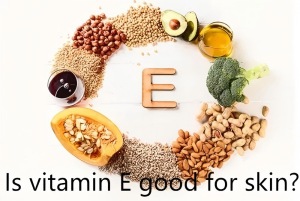Is vitamin E good for skin?

If you’ve ever browsed the skincare aisle, you’ve probably seen vitamin E popping up everywhere—from creams and serums to oils and supplements. But is vitamin E really good for your skin? The short answer: yes! Let’s break down why this superstar nutrient deserves a spot in your skincare routine.
Vitamin E is a powerful antioxidant, which means it helps protect your skin cells from damage caused by free radicals. Free radicals are unstable molecules that can lead to premature aging, wrinkles, and even dark spots. By fighting these harmful molecules, vitamin E helps your skin stay smooth, glowing, and youthful.
One of the most popular benefits of vitamin E is its moisturizing effect. It helps your skin retain moisture, making it soft and supple. This is especially great for people with dry or sensitive skin. You can find vitamin E in oils, lotions, and serums, or even get it through your diet with foods like almonds, sunflower seeds, and spinach.
Vitamin E is also known for its skin-healing properties. If you have minor cuts, scars, or sunburn, applying vitamin E topically may help speed up recovery and reduce the appearance of scars. Its anti-inflammatory qualities can also calm irritated skin, making it perfect for people with redness or sensitive skin types.
However, a little caution is needed. Using too much vitamin E oil directly on the skin can sometimes cause breakouts, especially if you have oily or acne-prone skin. Always start with a small amount and see how your skin reacts.
Incorporating vitamin E into your skincare routine can be as simple as choosing a moisturizer with vitamin E, adding a vitamin E serum at night, or eating a vitamin E-rich diet. This three-pronged approach helps your skin from the inside out, keeping it healthy, radiant, and youthful.
In summary, vitamin E is definitely good for skin. Its antioxidant, moisturizing, and healing properties make it a versatile ingredient for all skin types. So next time you see vitamin E on a product label, don’t just glance—it might just be your skin’s new best friend!
